6 Side Effects of Grinding Your Teeth at Night, Dentists Say
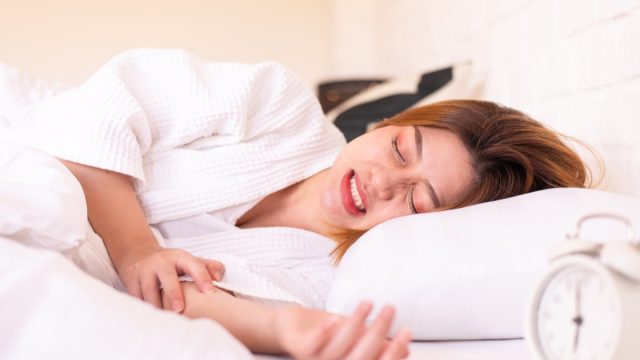
Bruxism—the technical term for grinding your teeth—is a dental disease on the rise, dentists say. Santa Clarita-based dentist Sean Kutlay, DDS, says the condition affects up to 30 percent of adults, and more and more of them are quite young. “We are seeing record number of young patients 18 to 30 grinding their teeth during the night and reporting clenching or grinding during the day,” he tells Best Life.
But outside of having a bedmate who can’t sleep because you’re gnashing your teeth at night, how do you know if you’re doing it? Dentists say there are a few things that can clue you in. Read on to find out six side effects of bruxism—and how to protect your pearly whites if you’re grinding at night.
READ THIS NEXT: This Common Bathroom Habit Is a “Disaster” for Your Teeth, Dentist Warns.
1
Difficulty chewing.
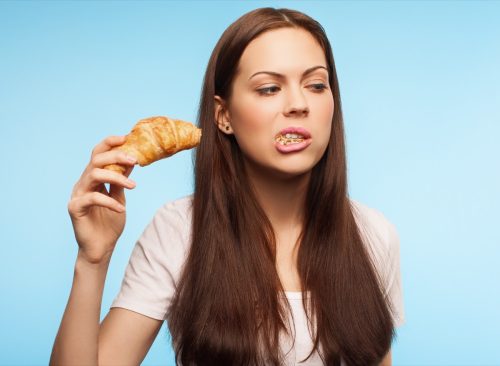
When you grind your teeth in your sleep, you exert about a thousand pounds of force per square inch on your poor chompers, says Silicon Valley-based reconstructive dentist Lior Tamir, DDS. Chewing, on the other hand, only creates about 150 pounds of force, he explains. “These forces are extremely detrimental to our teeth and supporting structures in our mouth,” he tells Best Life.
Putting all that pressure on your teeth can wreak havoc on your jaw’s temporomandibular joint (TMJ), causing a disorder known as TMJ Syndrome, the experts at Cedars-Sinai wrote on their blog. This can inhibit the range of motion in your jaw and prevent you from fully opening your mouth, which affects your ability to chew your food effectively.
2
Unexplained headaches.
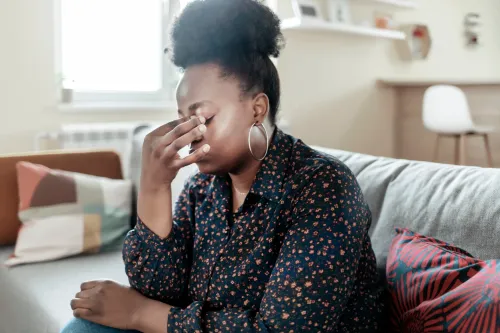
Waking up with a headache is almost always a red flag that something isn’t right with your body. If you’re not hung over, you’re getting plenty of sleep, and you’re still waking with a throbbing head, it could be due to bruxism, says Kutlay.
He says the best way to alleviate headaches and other bruxism side effects is to have your dentist make you a custom night guard to wear while you sleep. “This way when you grind, you are not creating tooth-to-tooth contact but rather grinding on the appliance,” he explains.
In addition to wearing a night guard, Kutlay recommends taking steps to ease anxiety. “Isolating sources of stress and anxiety and trying to eliminate those triggers during the day” may help you stop grinding, he explains. “A calming routine before bed can help tremendously.”
READ THIS NEXT: Never Do This After Brushing Your Teeth, Dentists Warn.
3
Popping sounds.
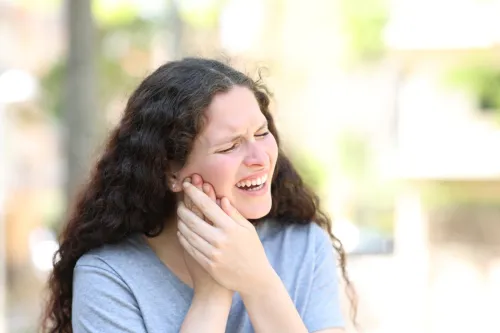
When you move your jaw, does it sound like cellophane crinkling or popcorn popping? That’s a common symptom of TMJ, the Cleveland Clinic reports. Those crunches, pops, and clicks are a clear sign that it’s time to get yourself to a dentist for a check-up.
“The traumatic forces of grinding could lead to bone loss,” says Tamir, underscoring the need to take this symptom seriously.
4
Jaw pain.
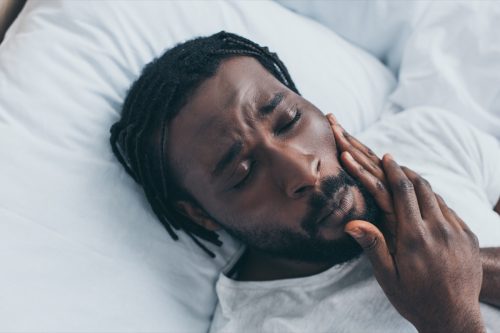
When you’re putting a thousand pounds of pressure on your teeth at night, it stands to reason that you might experience some pain upon waking. And indeed, Kutlay says unexplained jaw pain is an indicator that you might be grinding at night.
And if you think you can just pop some ibuprofen and call it a day, think again. “[Bruxism is] a slow and steady progression that leads to chipping and wear on the teeth which causes premature aging of the smile,” Kutlay explains. “This is one of the top reasons people seek cosmetic dental rehabilitation, to fix the damage caused by tooth grinding.”
Toothach
5
Tooth sensitivity.
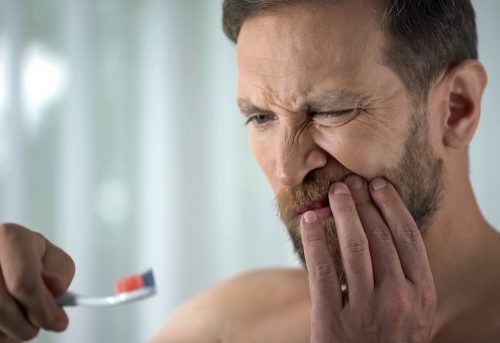
We’ve probably all had the experience of biting into something cold, or taking a sip of a hot drink, and feeling a zing from a sensitive tooth. But if you’re a grinder, you may notice this happening more and more frequently.
Tamir says this is often due to tooth damage from bruxism. “Our teeth develop gaps along the gumline called abfractions, which create more sensitive teeth,” Tamir says, and reiterates the need for “a properly fitted night guard designed for your bite” to help prevent further damage.
For more health news sent directly to your inbox, sign up for our daily newsletter.
6
Broken teeth.

If you don’t address your tooth-grinding, you could find yourself with a mouth full of dentures down the road. “We’ve seen people fracture parts of entire teeth in half from the forces of grinding,” Tamir tells Best Life.
Kutlay confirms this, saying that bruxism is “one of the leading causes of tooth loss. Long-term, we see people cracking and breaking fillings, crowns, implants, and even their own natural healthy teeth.” And while he notes that tooth-grinding “unfortunately cannot be cured,” he says that in addition to a night guard, injecting Botox into jaw muscles can help. “[Botox] has proven very effective at softening the muscle and reducing grinding and clenching.”
Best Life offers the most up-to-date information from top experts, new research, and health agencies, but our content is not meant to be a substitute for professional guidance. If you have specific health questions or concerns, always consult your healthcare provider directly.